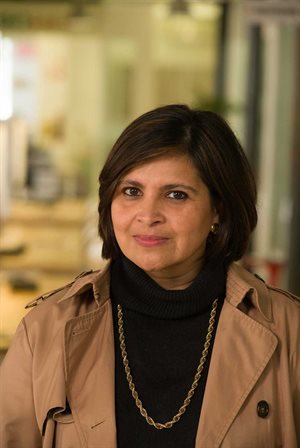There is no easy Covid-19 pivoting for not-for-profit organisations (NPOs), which are facing enormous financial, human resources and technology issues. NPO leaders are being challenged to think boldly and creatively about their financial and human resources, in terms of how we can replenish these so as to emerge from the crater caused by the pandemic.

Nazeema Mohamed, executive director, Inyathelo: The South African Institute for Advancement
We are also being challenged to embrace technology and find new ways of working. For Inyathelo, this has been a very real issue. We previously utilised our attractive and well-resourced office and conferencing spaces in Woodstock for our own training services, as well as hiring out space to others, and have had to transition to a virtual platform.
This in turn has its own complications as online training is a fairly new medium for us. Our clients expect to pay far less for the training, and do not realise that online training requires more preparation because it can so easily become tedious. While it is a highly efficient medium, there are fewer opportunities for familiar human connections, networking and team-building. We are still navigating this space and trying to assess what works ‒ and also how many hours our clients can remain online before they are thoroughly exhausted.
Added to the methodological issues related to training, we find that data and Wi-Fi access remain a problem. Data costs are extremely high and so participating in Zoom or Microsoft Teams meetings for hours becomes unaffordable for many.
To help address this, we have initiated the #keepconnecting campaign to raise funds to buy data vouchers for eligible NPOs. This will enable NPOs to work remotely and allow them to stay in touch with the communities they serve, as well as allowing them to take part in webinars and online learning events.
State response
Government has proclaimed the pandemic as a national state of disaster, yet its response to the disaster has unfortunately omitted a large component of the NPO sector whose work is so vital for displaced and disadvantaged communities.
NPO leaders have had to confront the idea that we are invisible to government; that we are not appropriately represented in NEDLAC, the key stakeholder advisory body to government; and that the Department of Social Development (DSD) has been unable to find solutions to the challenges raised by NPOs ‒ even though a team of non-profit leaders, particularly those whose organisations have been funded by the DSD, had requested a stimulus package to fund operations during the pandemic.
The DSD has cut funding instead of providing the much-needed relief that was required during the pandemic. Non-profit leaders have had no choice but to enter into litigation or find spaces to express their concerns with government’s approach.
The recent Eastern Cape High Court Hearing judgement against the DSD is a case in point. The DSD stopped paying the Imbumba Association of the Aged, consisting of 25 organisations that provide essential care to about 1,450 elderly people in the Eastern Cape.
Before lockdown, Imbumba mainly provided care at community centres, but when lockdown was announced, its care workers began going directly to the homes of the elderly beneficiaries instead. On 5 June 2020, the department unilaterally decided it would stop funding Imbumba. The Makhanda High Court ordered the Eastern Cape DSD to honour service-level agreements with 25 caregiver organisations looking after the elderly in the province.
In another case, SA Childcare and seven other applicants brought a case against the minister of social development and all MECs (except the Western Cape MEC) in October.
ECD sector brought to its knees
The early childhood development sector had been brought to its knees by nearly seven months of closure. Children lacked food and care and practitioners were out of options as the DSD withheld subsidies from the ECD centres which needed them most. Judgement was handed down in the North Gauteng High Court and the Minister and all MECs were ordered to pay full subsidies to all ECD centres during all lockdown levels, whether or not the centres were operational.
In Cape Town, we have seen the fumbling by local government on the issue of accommodation for the homeless. This has necessitated innovative action to ensure they have temporary safe shelter. Community Chest, for example, in an act of compassion and care, provided shelter for the homeless in their office space.
We have seen an organisation like South African History Online, an important national and global resource, face the prospect of closure. The CEO has tried endlessly to access funding from the Presidency, the Lottery and the Department of Arts and Culture as well as other sources. This is despite the organisation having a proud 20-year pedigree as the largest independent online history project in Africa, and having played a pioneering role in promoting a new people’s history as well as history education.
Covid-19 has also impacted NPOs that run social enterprises, which seek to make profits while also maximising benefits to society and the environment. Many such organisations have been impacted by the pandemic and have lost income due to revenue constraints and clients being unable to pay for services rendered.
The long-term impact of the situation is dire for NPOs and the under-resourced communities they serve, and will result in a much weaker civil society and democracy both at home and the rest of the continent.
No easy answers
The research report The impact of Covid-19 on African Civil Society Organizations sampled 1,015 civil society organisations from 44 African countries from 29 April to 15 May 2020. Even in those early days, 98% reported that Covid-19 had impacted and disrupted their operations in one or more ways; over half had already experienced a loss of funding, with 66.5% expecting to lose funding in the next 3-6 months; and 78% believed that Covid-19 would have a devastating impact on the sustainability of many CSOs.
Given the entrenched systemic problems that have been exacerbated by the pandemic, there are no easy answers. NPO leaders are faced with some tough decisions as they deal with great uncertainty in the ‘new normal’.
Access to information, research, webinars and training is a great help as they plan ahead. Please consider donating to our #keepconnecting campaign so that we can raise funds for much-needed data vouchers for eligible NPOs. We also encourage NPO leaders to access the many free resources on our ASKInyathelo website. These include publications, training videos, toolkits and research reports to build up their skills so that they can better pilot their organisations and attract funding in these extremely difficult times.
- Donate to the #keepconnecting campaign on backabuddy to help buy data vouchers for eligible NPOs: https://www.backabuddy.co.za/champion/project/kc.
- For access to publications, articles, guides and tips, click here.






































